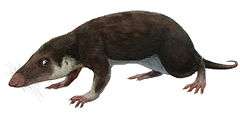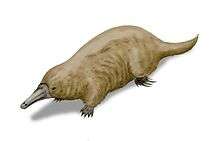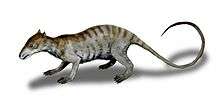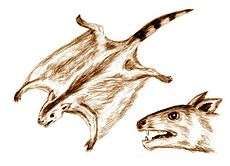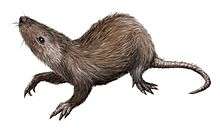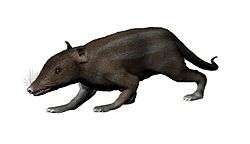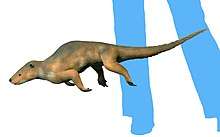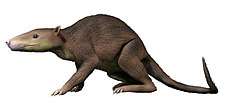Kollikodon
Kollikodon is an australosphenidan species, often classified as a monotreme but more recently recovered as an outgroup.[1] It is known only from an opalised dentary fragment, with one premolar and two molars in situ. The fossil was found in the Griman Creek Formation at Lightning Ridge, New South Wales, Australia, as was Steropodon.
| Kollikodon | |
|---|---|
| Scientific classification | |
| Kingdom: | Animalia |
| Phylum: | Chordata |
| Class: | Mammalia |
| Subclass: | Yinotheria |
| Infraclass: | Australosphenida |
| Family: | †Kollikodontidae Flannery, Archer, Rich & Jones, 1995 |
| Genus: | †Kollikodon Flannery, Archer, Rich & Jones, 1995 |
| Species: | †K. ritchiei |
| Binomial name | |
| †Kollikodon ritchiei Flannery, Archer, Rich & Jones, 1995 | |
| Synonyms | |
| |
Kollikodon lived in the Late Cretaceous period, during the Cenomanian age (99-96 million years ago).
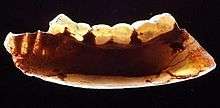
Like Steropodon, Kollikodon was a relatively large mammal for the Mesozoic. The molars have a length of around 5.5 mm and a width of between about 4 and 6 mm (Clemens et al., 2003). Based upon these data, the potential body length could be up to a metre.[2] Assuming the accuracy of such a guess, Kollikodon would be a contender for the largest Mesozoic mammal known, along with other possible giants such as Repenomamus, Schowalteria, and Bubodens.
Aside from its size, it is difficult to say what Kollikodon looked like. It is certain that its teeth were specialised to crush food, being perhaps a shellfish-eater or herbivore.
Both Kollikodon and Steropodon can be found at the Australian Museum in Sydney, along with Eric, the opalised pliosaur.
Etymology
Kollix is an ancient Greek word (κολλίξ) for a bread roll. The strange teeth of Kollikodon, when seen from above, resemble hot cross buns, traditionally toasted and eaten on Good Friday. Originally, Michael Archer wanted to name it "Hotcrossbunodon", but met disapproval from his associates.[3]
References
| Wikispecies has information related to Kollikodon |
- Rebecca Pian; Michael Archer; Suzanne J. Hand; Robin M.D. Beck; Andrew Cody (2016). "The upper dentition and relationships of the enigmatic Australian Cretaceous mammal Kollikodon ritchiei". Memoirs of Museum Victoria. 74: 97–105.
- Anne Weil, Mammalian palaeobiology: Living large in the Cretaceous, Nature 433, 116-117 (13 January 2005) doi:10.1038/433116b; Published online 12 January 2005
- John A. Long; Michael Archer; Timothy Flannery; Suzanne Hand (2002). Prehistoric mammals of Australia and New Guinea: One hundred million years of evolution. Baltimore, Maryland: Johns Hopkins University Press. p. 39. ISBN 978-0801872235.
- Flannery, T.F., Archer, M., Rich, T.H., Jones, R. (1995) "A new family of monotremes from the Cretaceous of Australia". Nature 377: 418-420.
External links
- Australian Museum online: Lightning Ridge Opal fossils from Oz.
- Australian Museum online Some observations on Hotcrossbunidon.
- Australian Museum online, Collection Highlights
